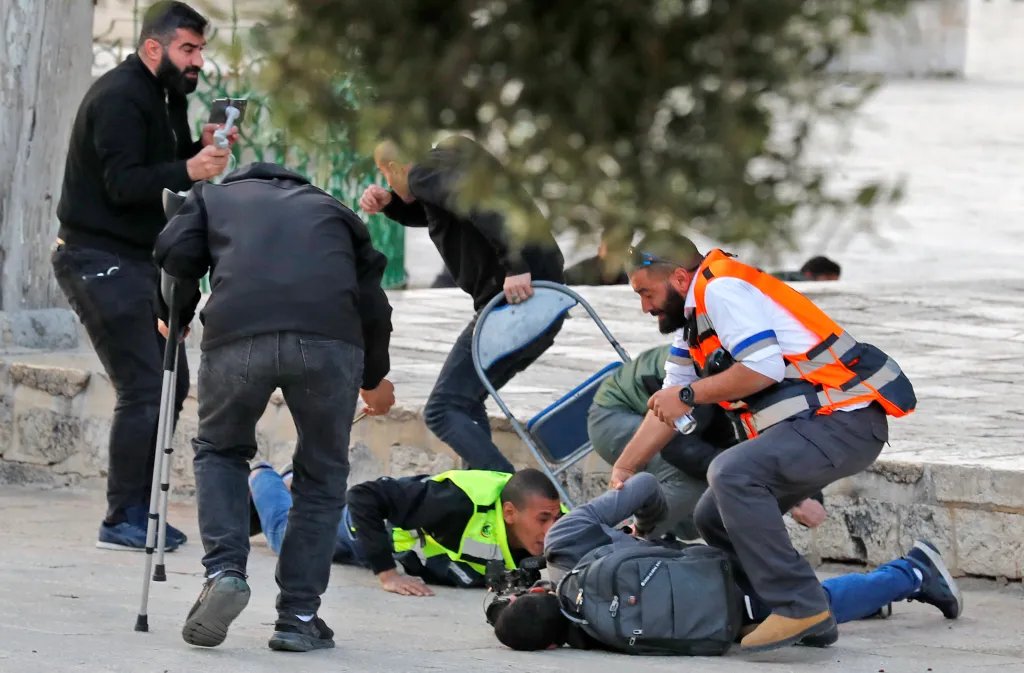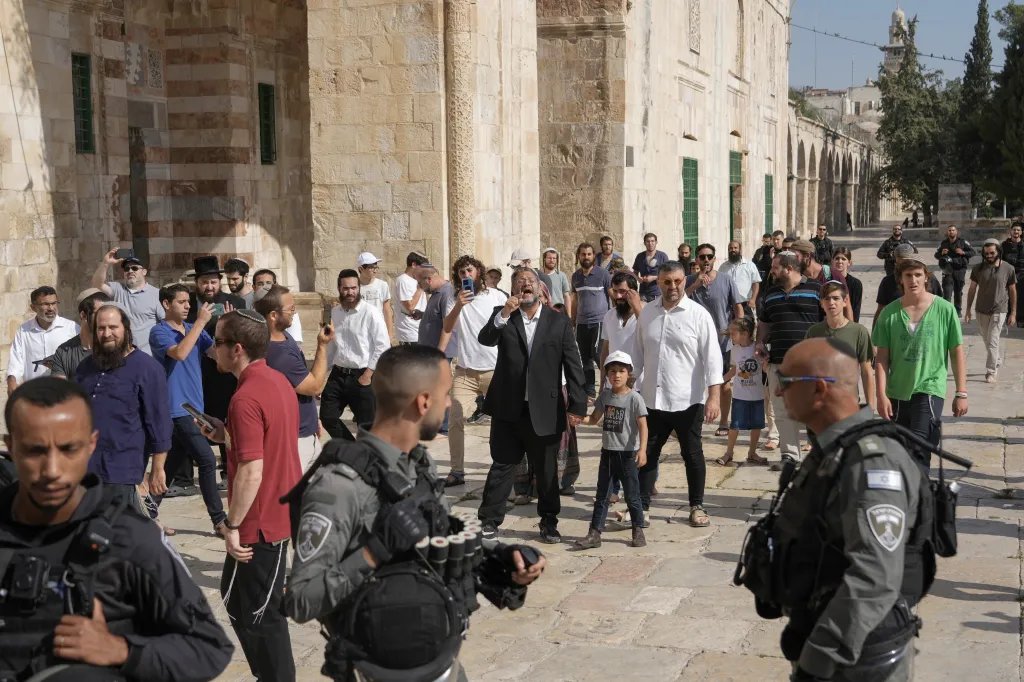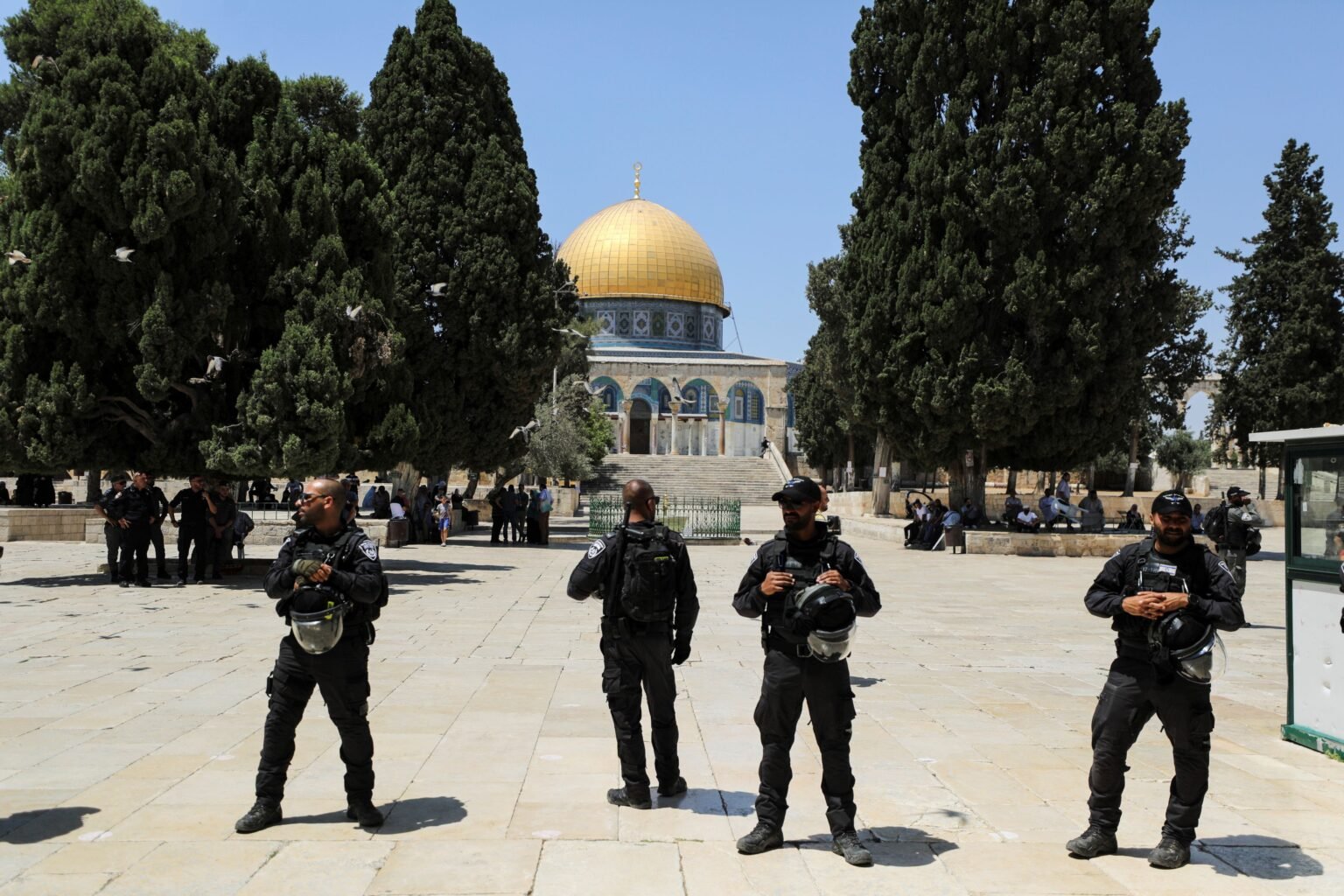Listen to the article
Nazareth, November 4, 2025—Israeli police banned at least 10 Palestinian journalists from Jerusalem’s disputed Al-Aqsa Mosque compound during Ramadan this year, CPJ has found, in what many view as a deliberate effort to censor coverage of the holy site.
Intimidatory tactics against the press have increased in the two years since the start of the Israel-Gaza war, journalists and human rights experts told CPJ, with police summoning journalists for questioning, alleging that they posed security risks or could incite riots.
Al-Aqsa has long been a sensitive flashpoint. Israel has restricted Palestinians’ access in recent years, while visits from right-wing Israeli politicians, like security minister Itamar Ben-Gvir, have inflamed tensions.
Located in Jerusalem’s Old City, Al-Aqsa is Islam’s third holiest site and part of a compound also sacred to Jews, who call it the Temple Mount. Israel captured East Jerusalem, including the Old City, from Jordan in 1967 and later annexed it, in a move widely not recognised internationally.
“The bans on journalists have always existed, but they became more frequent and aggressive under the current far-right government — and turned into a nightmare after October 7, 2023,” a person working with the Islamic Waqf in Jerusalem, the Jordanian-run body that manages the Al-Aqsa compound, told CPJ on condition of anonymity, citing fear of reprisals.
“Since then, even ordinary people filming on their phones risk arrest, expulsion, or assault. The police want full control over the image from Al-Aqsa — to appear as if they alone are in charge.”
‘Police do not disclose any evidence’’
In interviews with CPJ, the 10 journalists confirmed that they were banned during the Muslim holy month of Ramadan, which began on February 28. The true figure is likely higher, as many journalists fear speaking out could trigger renewed bans. Half of the bans were subsequently extended.
Freelance journalist Mohammed Sadiq, 47, received his first ban of the year during Ramadan, followed on September 11 by a one-week ban, which was renewed on September 25 for four months until January 2026.
“They said my presence could cause riots, but I only carry a camera for documentation,” said Sadiq, highlighting that he has no criminal record. “These decisions directly affect my work. They not only prevent me from entering Al-Aqsa, but also from approaching the streets of the Old City, which effectively means emptying the area of journalists.”
Another Jerusalem journalist, who asked to remain anonymous, told CPJ that he was banned for six days on March 10, and again on September 9. CPJ reviewed copies of the ban orders.
“I explained I’ve been a journalist for more than 10 years, that I’m a member of the Israeli Journalists Syndicate and the International Federation, and that I pose no threat … but they said my presence could threaten public order,” he said.
Most of the journalists received a summons by phone or a visit to their home to go to a police station and sign an order acknowledging they had been banned from Al-Aqsa. They said they were entitled to a hearing but, in reality, they were often questioned at length, without explanation as to why they had been summoned.
“The police do not disclose any evidence in their possession,” Nir Guntag, who monitors such violations for the Union of Journalists in Israel, told CPJ. “Out of fear and exhaustion, journalists usually sign just to end the ordeal.”
“We estimate that there are dozens of similar cases every year, and the majority of those subjected to them are Arab journalists. This is a grave violation of press freedom,” Guntag added.

Other journalists shared similar ordeals:
- Photographer Mohammed Qarout Edkaidek told CPJ that he received a one-week ban on March 1, which was extended to one month. He said his equipment had been confiscated repeatedly.
- On March 2, Bassem Zidani, 38, who contributes to Lebanon-based TV channel Al-Mayadeen and Turkish-state owned broadcaster TRT, was informed by phone that he was banned from Al-Aqsa for a week, the freelance journalist told CPJ. At the Old City’s Al-Qishla police station the next day, police cited a “secret file” that alleged his presence would “cause trouble.” Zidani returned on March 9, only to be handed a three-month ban “without any right to object.”
- Freelance photographer Mohammed Abu Sneineh, 20, told CPJ that he was detained while entering Al-Aqsa Mosque on March 2 and banned until March 9. The ban was then extended for four months on the grounds that there was a risk of him “inciting riots through filming,” he said.
- Freelance journalist Nadine Jaafar, 22, told CPJ that she was banned for a week on March 4. On April 11, she was arrested inside Al-Aqsa and banned for another week.
- Freelance photographer Mohammed Dweik, 32, told CPJ that he was banned on March 17 for two months for “security reasons.”
- Freelance journalist Latifa Abdel Latif told CPJ that she was arrested on March 16 and banned on March 19 for one week.
- Freelance photographer Wahbi Mekki, 40, told CPJ he was banned for six months on March 19 after accusations of posing “a threat” and supporting “Hamas terrorism.”
- Saif Qawasmi, 24, a freelance photographer for Al Jazeera Mubasher, was issued with a four-month ban on March 28. He told CPJ that he had been banned six times in five years.

“The police don’t want media coverage of their actions, so it’s no surprise that harassment of Palestinian journalists inside Al-Aqsa is increasing,” Aviv Tatarsky, a researcher with Ir Amim, a nonprofit that promotes equality for Palestinians and Israelis in Jerusalem, told CPJ.
“These restrictions intensify ahead of Jewish holidays, as the police prefer right-wing presence in Al-Aqsa to go undocumented. And it’s even clearer that such practices have escalated since October 7,” he added, referring to visits by politicians.
Israeli police confirmed to CPJ via messaging app that they had issued “a number of exclusion orders” but declined to provide further information.
The exclusions are not confined to Ramadan.
On November 2, freelance journalist Majdi al-Abbasi was banned from Al-Aqsa for one week — a restriction that can be extended for four to six months — after being arrested while filming Friday prayers on October 31.
The journalist was taken to Jerusalem’s Qishleh police station where his phone was confiscated and he was questioned for more than two hours about “disturbing public order” and “obstructing police work,” his brother Mahdi al-Abbasi told CPJ.
Majdi al-Abbasi is due to return to the police station on November 9 to hear whether the ban will be extended.
Read the full article here
Fact Checker
Verify the accuracy of this article using AI-powered analysis and real-time sources.


